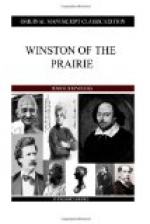“When were you unfortunate?” said the girl.
Winston smiled somewhat dryly. “I was unfortunate for six years on end.”
He was aware of the blunder when he had spoken, but Maud Barrington appeared to be looking at the flask thoughtfully.
“The design is very pretty,” she said. “You got it in England?”
The man knew that it was the name F. Winston his companion’s eyes rested on, but his face was expressionless. “Yes,” he said. “It is one of the things they make for presentation in the old country.”
Maud Barrington noticed the absence of any attempt at explanation, and having considerable pride of her own, was sensible of a faint approval. “You are making slow progress,” she said, with a slight but perceptible difference in her tone. “Now, you can have eaten nothing since breakfast.”
Winston said nothing, but by and by poured a little of the spirit into a rusty can, and the girl, who understood why he did so, felt that it covered several of his offenses. “Now,” she said graciously, “you may smoke if you wish to.”
Winston pointed to the few billets left and shook his head. “I’m afraid I must get more wood.”
The roar of wind almost drowned his voice, and the birch logs seemed to tremble under the impact of the blast, while Maud Barrington shivered as she asked, “Is it safe?”
“It is necessary,” said Winston, with the little laugh she had already found reassuring.
He had gone out in another minute, and the girl felt curiously lonely as she remembered stories of men who had left their homesteads during a blizzard to see to the safety of the horses in a neighboring stable, and were found afterwards as still as the snow that covered them. Maud Barrington was not unduly timorous, but the roar of that awful icy gale would have stricken dismay into the hearts of most men, and she found herself glancing with feverish impatience at a diminutive gold watch and wondering whether the cold had retarded its progress. Ten minutes passed very slowly, lengthened to twenty more slowly still, and then it flashed upon her that there was at least something she could do, and scraping up a little of the snow that sifted in, she melted it in the can. Then she set the flask top upon the stove, and once more listened for the man’s footsteps very eagerly.
She did not hear them, but at last the door swung open, and carrying a load of birch branches Winston staggered in. He dropped them, strove to close the door and failed, then leaned against it, gasping, with a livid face, for there are few men who can withstand the cold of a snow-laden gale at forty degrees below.
How Maud Barrington closed the door she did not know, but it was with a little imperious gesture she turned to the man.
“Shake those furs at once,” she said, and drawing him towards the stove held up the steaming cup. “Now sit there, and drink it.”




